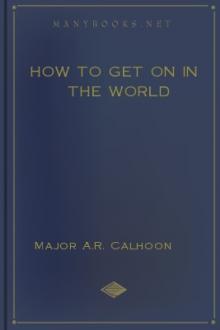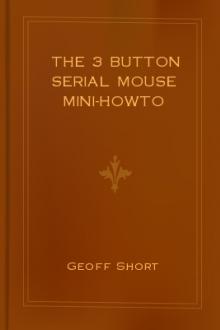How to Get on in the World, Alfred Rochefort Calhoun [read any book txt] 📗

- Author: Alfred Rochefort Calhoun
- Performer: -
Book online «How to Get on in the World, Alfred Rochefort Calhoun [read any book txt] 📗». Author Alfred Rochefort Calhoun
Yet Washington had a most modest opinion of himself; and when offered the chief command of the American patriot army he hesitated to accept it until it was pressed upon him. When acknowledging in Congress the honor which had been done him in selecting him to so important a trust, on the execution of which the future of his country in a great measure depended, Washington said: "I beg it may be remembered, lest some unlucky event should happen unfavorable to my reputation, that I this day declare, with the utmost sincerity, I do not think myself equal to the command I am honored with."
And in his letter to his wife, communicating to her his appointment as commander-in-chief, he said: "I have used very endeavor in my power to avoid it, not only from my unwillingness to part with you and the family, but from a consciousness of its being a trust too great for my capacity; and that I should enjoy more real happiness in one month with you at home than I have the most distant prospect of finding abroad, if my stay were to be seven times seven years. But, as it has been a kind of destiny that has thrown me upon this service, I shall hope that my undertaking is designed for some good purpose. It was utterly out of my power to refuse the appointment, without exposing my character to such censures as would have reflected dishonor upon myself, and given pain to my friends. This, I am sure, could not, and ought not, to be pleasing to you, and must have lessened me considerably in my own esteem."
Washington pursued his upright course through life, first as commander-in-chief, and afterward as President, never faltering in the path of duty. He had no regard for popularity, but held to his purpose through good and through evil report, often at the risk of his power and influence. Thus, on one occasion, when the ratification of a treaty, arranged by Mr. Jay with Great Britain, was in question, Washington was urged to reject it. But his honor, and the honor of his country, was committed, and he refused to do so. A great outcry was raised against the treaty, and for a time Washington was so unpopular that he is said to have been actually stoned by the mob. But he, nevertheless, held it to be his duty to ratify the treaty; and it was carried out in despite of petitions and remonstrances from all quarters. "While I fell," he said, in answer to the remonstrants, "the most lively gratitude for the many instances of approbation from my country, I can no otherwise deserve it than by obeying the dictates of my conscience."
When the Oregon, coming along the Atlantic coast, was struck in the middle of the night by that coaster, and a great wound was made in her side, through which the water was pouring, Captain Murray stood on the bridge as calm, apparently, as a May morning, and waited until every passenger was off, and every officer was off, and every man on the crew was off, and the last man to step from the sinking ship was the captain himself; and ten minutes after he stepped off, the steamer gave a quiver, as of apprehension, and then plunged to the bottom of the ocean. The steamer was his, and the men were his, and the boats were his, and the passengers were his, all for this: that he might save them in time of peril; and he would go down to the bottom of the ocean rather than that, by his recreancy, one of those entrusted to him should perish. This was the true hero, the man who would die rather than be false to duty.
One of the most striking instances that could be given of the character of the dutiful, truthful, laborious man, who works on bravely in spite of difficulty and physical suffering, is presented in the life of the late George Wilson, Professor of Technology in the University of Edinburgh. Wilson's life was, indeed, a marvel of cheerful laboriousness; exhibiting the power of the soul to triumph over the body, and almost to set it at defiance. It might be taken as an illustration of the saying of the whaling-captain to Dr. Kane, as to the power of moral force over physical: "Bless you, sir, the soul will any day lift the body out of its boots!"
A fragile but bright and lively boy, he had scarcely entered manhood ere his constitution began to exhibit signs of disease. As early, indeed, as his seventeenth year, he began to complain of melancholy and sleeplessness, supposed to be the effects of bile. "I don't think I shall live long," he then said to a friend; "my mind will—must work itself out, and the body will soon follow it." A strange confession for a boy to make! But he gave his physical health no fair chance. His life was all brain work, study, and competition. When he took exercise it was in sudden bursts, which did him more harm than good. Long walks in the Highlands jaded and exhausted him; and he returned to his brain-work unrested and unrefreshed.
It was during one of his forced walks of some twenty-four miles, in the neighborhood of Stirling, that he injured one of his feet, and he returned home seriously ill. The result was an abscess, disease of the ankle-joint, and a long agony, which ended in the amputation of the right foot. But he never relaxed in his labors. He was now writing, lecturing and teaching chemistry. Rheumatism and acute inflammation of the eye next attacked him, and were treated by cupping, blistering, and colchicum. Unable himself to write, he went on preparing his lectures, which he dictated to his sister. Pain haunted him day and night, and sleep was only forced by morphia. While in this state of general prostration symptoms of pulmonary disease began to show themselves. Yet he continued to give the weekly lectures to which he stood committed to the Edinburgh School of Arts. Not one was shirked, though their delivery, before a large audience, was a most exhausting duty. "Well, there's another nail put into my coffin," was the remark made on throwing off his top-coat on returning home; and a sleepless night almost invariably followed.
At twenty-seven, Wilson was lecturing ten, eleven, or more hours weekly, usually with setons or open blister-wounds upon him—his "bosom friends," he used to call them. He felt the shadow of death upon him, and he worked as if his days were numbered. "Don't be surprised," he wrote to a friend, "if any morning at breakfast you hear that I am gone." But while he said so, he did not in the least degree indulge in the feeling of sickly sentimentality. He worked on as cheerfully and hopefully as if in the very fullness of strength. "To none," said he, "is life so sweet as to those who have lost all fear of dying."
Sometimes he was compelled to desist from his labors by sheer debility, occasioned by loss of blood from the lungs; but after a few weeks' rest and change of air, he would return to his work, saying, "The water is rising in the well again!" Though disease had fastened on his lungs, and was spreading there, and though suffering from a distressing cough, he went on lecturing as usual. To add to his troubles, when one day endeavoring to recover himself from a stumble occasioned by his lameness, he overstrained his arm, and broke the bone near the shoulder. But he recovered from his successive accidents and illnesses in the most extraordinary way. The reed bent, but did not break; the storm passed, and it stood erect as before.
There was no worry, nor fever, nor fret about him; but instead, cheerfulness, patience and unfailing perseverance. His mind, amidst all his sufferings, remained perfectly calm and serene. He went about his daily work with an apparently charmed life, as if he had the strength of many men in him. Yet all the while he knew he was dying, his chief anxiety being to conceal his state from those about him at home, to whom the knowledge of his actual condition would have been inexpressibly distressing. "I am cheerful among strangers," he said, "and try to live day by day as a dying man."
He went on teaching as before—lecturing to the Architectural Institutes and to the School of Arts. One day, after a lecture before the latter institute, he lay down to rest, and was shortly awakened by the rupture of a blood-vessel, which occasioned him the loss of a considerable quantity of blood. He did not experience the despair and agony that Keats did on a like occasion, though he equally knew that the messenger of death had come, and was waiting for him. He appeared at the family meals as usual, and next day he lectured twice, punctually fulfilling his engagements; but the exertion of speaking was followed by a second attack of hemorrhage. He now became seriously ill, and it was doubted whether he would survive the night. But he did survive; and during his convalescence he was appointed to an important public office—that of director of the Scottish Industrial Museum, which involved a great amount of labor, as well as lecturing, in his capacity of professor of technology, which he held in connection with the office.
From this time forward, his "dear museum," as he called it, absorbed all his surplus energies. While busily occupied in collecting models and specimens for the museum, he filled up his odds-and-ends of time in lecturing in Ragged Schools and Medical Missionary Societies. He gave himself no rest, either of mind or body; and "to die working" was the fate he envied. His mind would not give in, but his poor body was forced to yield, and a sever attack of hemorrhage—bleeding from both lungs and stomach—compelled him to relax in his labors. "For a month, or some forty days," he wrote—"a dreadful Lent—the wind has blown geographically from 'Araby the blest,' but thermometrically from Iceland the accursed. I have been made a prisoner of war, hit by an icicle in the lungs, and have shivered and burned alternately for a large portion of the last month, and spat blood till I grew pale with coughing. Now I am better, and to-morrow I give my concluding lecture (on technology), thankful that I have contrived, notwithstanding all my troubles, to early on without missing a lecture to the last day of the Faculty of Arts, to which I belong."
How long was it to last? He himself began to wonder, for he had long felt his life as if ebbing away. At length he became languid, weary, and unfit for work; even the writing of a letter cost him a painful effort, and he felt "as if to lie down and sleep were the only things worth doing." Yet shortly after, to help a Sunday school, he wrote his "Five Gateways of Knowledge," as a lecture, and afterward expanded it into a book. He also recovered strength sufficient to enable him to proceed with his lectures to the institutions to which he belonged, besides on various occasions undertaking to do other people's work. "I am looked upon as being as mad," he wrote to his brother, "because on a hasty notice, I took a defaulting lecturer's place at the Philosophical Institution, and discoursed on the polarization of light





Comments (0)